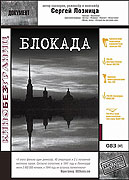Tartalmak(1)
Egészen különleges bepillantást nyerhetünk a második világháborúban ostromlott Leningrád hétköznapjaiba. Sergei Loznitsa eddig ismeretlen film- és híradórészletekre bukkant, amelyek fél évszázadon át levéltárak mélyén rejtőztek. A híradófelvételek azért nem kerültek eddig a nyilvánosság elé, mert a hatóságok propagandacélokra alkalmatlanoknak ítélték őket. Loznitsa összeállítása szöges ellentéte annak, ahogyan a szovjet időkben ábrázolták a blokádot: sok pátosszal, az önfeláldozás dicsőítésével, a heroikus küzdelemmel a munka frontján. Ez a film nem szenzációhajhász, nincs benne kísérőzene, sem kísérőszöveg - filmművészeti példája annak, amit Barthes "az írás nullpontjának" nevez. Ennek ellenére meg tudja ragadni az ostromlott város szenvedését. A képek mélysége és minimalizmusa valódi epikus narratívát hoz létre, amely teret hagy a néző számára, hogy megfogalmazza saját reakcióját a látottakra. (Verzió - Nemzetközi Emberi Jogi Dokumentumfilm Fesztivál)
(több)Recenziók (1)
Loznica films do not want to say anything - they simply show it. And yet they are able to shout their message to the world. The USSR/Russia had and still has special luck with the montage documentary genre: Esfir Shub invented it in the 1920s and eighty years later Loznica proves its power even for a 21st century documentary with artistic ambitions. At the same time, yesterday and today, the manipulative power that the director holds is demonstrated. Shub was already able to direct the viewer's understanding of historical events through editing and commentary intertitles. Loznica also pushes the perception of the recorded material but through a different medium - sound. Sound, or rather how it is missing in many moments, or how it is lazy, muted, how it rarely but urgently attacks, and how it evokes a strange frozen atmosphere in the viewer. It is as if even the sound was slowly starving and no longer had the strength to shout or scream - like in weeklies from the war, like in war movies, and like in second-rate documentaries, where the same images appear anyway. Or in the case when Loznica pulls them out of the (silence) archive after sixty years and gives them a voice - but a muted, waiting, resigned voice, perfectly opposite to the normal lively city. That is far more impressive than any shot of lying dead bodies.
()
Galéria (9)
Photo © ANTIPODE Sales & Distribution llc.

